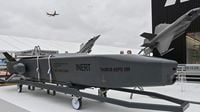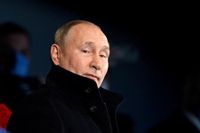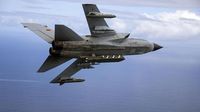The ongoing conflict in Ukraine is drawing renewed attention as Friedrich Merz, the likely new Chancellor of Germany, has indicated a willingness to consider the delivery of Taurus cruise missiles to Ukraine. This marks a significant shift from the previous administration's stance, which firmly opposed such measures. Merz's comments were made during discussions with European partners, suggesting a potential escalation in Germany's military support for Ukraine amid the ongoing war with Russia.
On April 13, 2025, Merz stated that the delivery of the Taurus missiles could be coordinated with European allies, emphasizing Germany's commitment to supporting Ukraine in its defense against Russian aggression. This position has sparked a strong response from the Kremlin, which has warned that any attack using these missiles on Russian targets would be interpreted as a "direct participation" of Germany in the conflict. Maria Sacharowa, a spokesperson for the Russian Foreign Ministry, expressed that such actions would carry significant consequences for Germany.
According to Sacharowa, the use of Taurus missiles would require direct support from German soldiers, highlighting the complexities involved in military engagement. She stated, "An attack with these missiles against Russian facilities will be perceived as Germany's direct involvement in the fighting alongside the regime in Kyiv, with all the consequences that entails." This stern warning underscores the delicate balance of military support that European nations must navigate in their response to the war.
The Taurus cruise missile, developed by Taurus Systems GmbH, has been a point of contention due to its advanced capabilities. With a range of approximately 500 kilometers and the ability to fly at low altitudes, the missile poses a significant threat to Russian military infrastructure. It can be launched from a safe distance, allowing Ukrainian forces to strike targets deep within Russian-controlled territory without exposing themselves to direct retaliation.
Germany has been a major supplier of arms to Ukraine, ranking second only to the United States, according to the Kiel Institute for the World Economy. The Ukrainian government formally requested the delivery of Taurus missiles in May 2023, seeking to enhance its military capabilities in the face of ongoing hostilities. The missile's precision and long-range capabilities make it a highly sought-after asset for the Ukrainian military, which has been struggling with ammunition shortages and the need for advanced weaponry.
In a recent SPD event, current Defense Minister Boris Pistorius acknowledged the arguments for and against the delivery of Taurus missiles, stating, "There are good arguments for the delivery and use of Taurus, and there are many arguments against it." This reflects the ongoing debate within German politics regarding military support for Ukraine and the potential repercussions of such actions.
Merz's proposal has drawn both support and opposition within Germany. While some view it as a necessary step to bolster Ukraine's defense, others, including members of the outgoing Scholz administration, remain cautious about escalating tensions with Russia. Olaf Scholz had consistently rejected the idea of supplying Taurus missiles, fearing that it could lead to Germany being drawn further into the conflict.
The Kremlin's reaction has been swift, with Dmitry Peskov, a spokesperson for the Russian government, warning that Merz's actions could lead to a "new escalation" in the conflict. This sentiment was echoed by Wladimir Konstantinow, the chairman of the Crimean Parliament, who urged German authorities to cease speculating about the delivery of Taurus missiles. Such statements highlight the Kremlin's sensitivity to discussions surrounding military support for Ukraine and its implications for regional stability.
Meanwhile, diplomatic efforts to resolve the conflict continue, with representatives from the United States and several European nations convening in Paris on April 17, 2025. French President Emmanuel Macron hosted a working lunch with U.S. officials, including Steve Witkoff and Marco Rubio, to discuss potential pathways to end the Russian war of aggression against Ukraine. The ongoing talks indicate a collaborative approach among Western allies to address the crisis and support Ukraine's sovereignty.
In addition to military considerations, the diplomatic landscape is evolving, with Ukraine and the U.S. expected to sign a letter of intent on the exploitation of rare raw materials. This agreement could further strengthen ties between the two nations and provide economic benefits amid the ongoing conflict.
As the situation develops, the implications of Merz's statements and the potential delivery of Taurus missiles remain uncertain. The balance between military support for Ukraine and the risk of escalating tensions with Russia is a complex challenge that will require careful navigation by German and European leaders.
In summary, the discussions surrounding the potential delivery of Taurus missiles to Ukraine reflect a pivotal moment in Germany's military policy and its role in the ongoing conflict. With the Kremlin's stern warnings and the complexities of international diplomacy at play, the coming weeks will be critical in shaping the future of military support for Ukraine and the broader geopolitical landscape.







